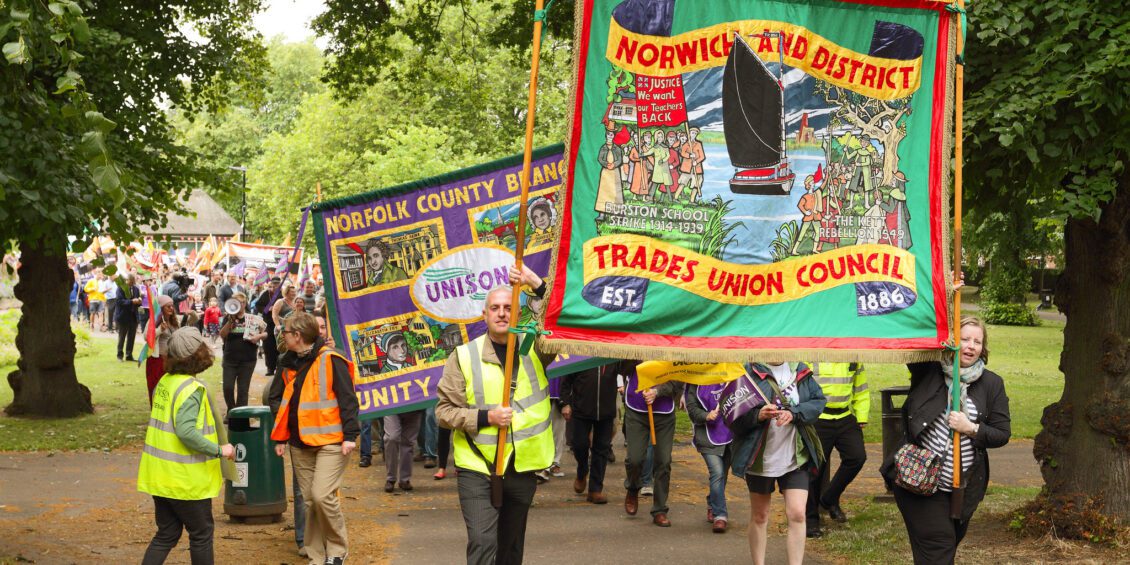
The good news is that you now have more choice than ever before, but let’s take a step back before we get to the list of unions that support proportional representation (PR).
A strong, collective voice is at the heart of every successful trade union. A trade union’s power comes from having a united membership, who are clear about what they want, able to articulate the reasons why that is important and united in the action they will take to get there.
When making your decision about which union to join, the answer should always be, the one that is most appropriate to the work you do and has a voice in your workplace. Where a union has a high density of membership and collective bargaining, they are better able to improve pay and conditions for their members.
You can help change union policy to support proportional representation
But don’t be put off if the union(s) in your workplace don’t yet have policy on PR or are not in favour of it – you can help change that, by becoming an advocate and building support for PR within your union.
Unions make policy decisions at their annual conferences, based on motions passed in their branches, at a local level. The democratic processes within each union allow members to ask for new policies or for existing policies to be amended, so you have the power to help change policy.
The more unions that support PR, the better our chances of ensuring that politicians change the law so that everyone’s vote counts equally. At the moment, the Conservatives are busy changing the law in the other direction, imposing our broken First Past the Post (FPTP) voting system on Mayoral and Police and Crime Commissioner elections and ‘gerrymandering’ elections across the country with new voter ID rules.
The truth is wherever new legislatures like the Scottish Parliament and the Welsh Assembly were created, progressive politicians ensured they were elected using better and more proportional systems than First Past the Post, so that every vote would count equally. Even the roles of elected mayors were created using the preferential Supplementary Vote.
Conservatives are scared of every vote mattering
Unfortunately, the Conservatives have realised that if they allow politicians to be elected under PR, most people might not want them, so this year, they changed the system for electing mayors – and guess what happened?
As the Electoral Reform Society explains, in Bedford, Tory candidate Tom Wootton won with just a third (33%) of the vote under a First Past the Post voting system. The previous Mayor was Liberal Democrat, Dave Hodgson who won in 2019 with just over half (54%) of the vote under a preferential voting system. Which seems fairer to you?
If you were in any doubt about their motives, listen to this speech by Lord Peter Cruddas (a Conservative) who said:
“If Labour wins they will reduce the voting age, abolish voter ID, and introduce Proportional Representation making it impossible for the Conservative party to win an outright majority in the future.”
Or put more simply, by making our country more democratic, by empowering more people to vote and be represented by someone they want, the Tories would be stopped in their tracks.
Until recently, many trade unions saw voting systems as peripheral to industrial issues. We’ve worked hard to explain the cause and effect of voting systems on the reduced rights of working people and the trade unions that represent them.
The unions that support proportional representation
As a result, at least eleven unions now support PR, including ASLEF, BFAWU, FBU, Musicians Union, PCS, Prospect, TSSA, UCU, USDAW, Unison and Unite. Between them, they represent well over 3 million members and their voices need to be heard.
Without a fairer voting system, the Tories will continue to gain an unfair advantage, winning elections and gaining a majority of MPs in Parliament, on less than half the national vote. In 2015, the Conservatives won on 37% of the vote; in 2017, they got back into power by working with the hard right DUP on a combined 43% of the vote and in 2019 on their own with just 43 % of the vote but gaining 56% of the seats in Parliament.
Each time they gain power, they introduce more draconian laws restricting trade union rights. By contrast, all of the EU countries which have embedded trade union rights, and have high union density and collective bargaining coverage, are democracies which employ PR electoral systems.
Here in the UK we are living with a political system that is not only broken but one that is being gerrymandered to keep a right-wing government in power, in perpetuity.
As Julian Vaughan, ASLEF rep and Politics for the Many Steering Group member said;
“In 2019, like almost every single General Election since the second world war, the left got more votes than the right. And still, we were locked out of power. The gains workers make are all too often swept away by a system at Westminster that systematically benefits reactionaries against those who stand for real progress.”
If you want to be part of a progressive movement to secure a fairer voting system, join Politics for the Many now (it’s free) and help us build a politics that works for the many.